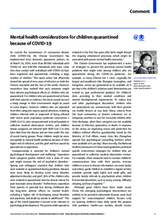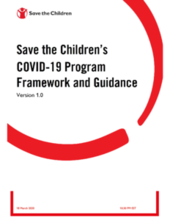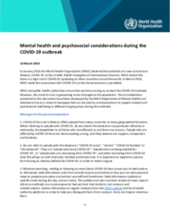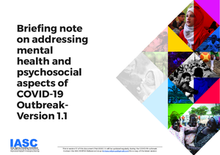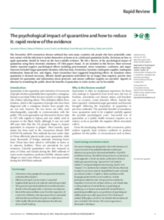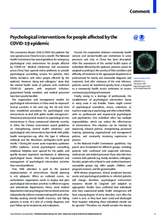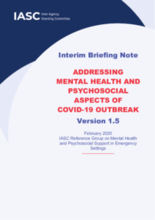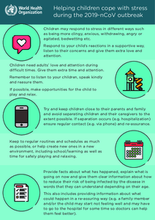This section includes resources and tools for mental health and psychosocial support during the COVID-19 pandemic.
Displaying 41 - 50 of 65
This comment from the Lancet reviews the implications of the COVID-19 crisis on children's mental health, including children who are separated from their caregivers.
This framework represents Save the Children’s planning assumptions and priority areas for implementation over four phases of programming: Preparedness, Initial Response, Large-Scare Response, and Recovery.
The considerations presented in this document have been developed by the WHO Department of Mental Health and Substance Use as a series of messages that can be used in communications to support mental and psychosocial well-being in different target groups, including carers of children, during the outbreak.
Dr. Giuseppe (Bepi) Raviola, director of mental health at Partners In Health, has put together this list of key practices - including positive family time - to maintain good mental and emotional health for those asked to stay at home in efforts to prevent further spread of the novel coronavirus, or COVID-19.
This document summarizes key mental health and psychosocial support (MHPSS) considerations in relation to the COVID-19 outbreak, such as appropriate MHPSS responses, overarching principles and globally recommended activities.
The authors of this paper conducted a review of the psychological impact of quarantine, including the impact on children, using three electronic databases.
In this comment, the authors have suggested ways that the Chinese government could establish and improve the intervention system based on sound scientific advice, to effectively deal with the mental health problems caused by public health emergencies.
This briefing note summarizes key mental health and psychosocial support (MHPSS) considerations in relation to the 2019 novel coronavirus (COVID-19) outbreak.
On this webpage, ISPCAN has gathered resources on how to navigate through the COVID 19 pandemic.
This one page leaflet from the World Health Organization offers advice to parents and caregivers on how to help children cope with stress during the COVID-19 pandemic.

